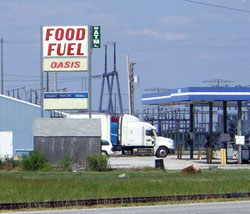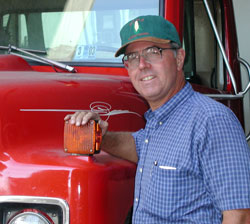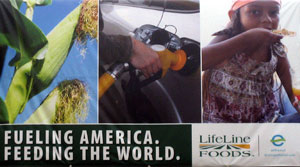There is an interesting, if quite rambling, commentary in the American Chronicle written by Stafford “Doc” Williamson, who is a “consultant, writer and president of a small company with very diversified interests in a wide range of fields.”
Doc makes a variety of points, starting out with saying that the efficiency, or lack thereof, of ethanol production “doesn’t matter.” He compares it to rocket fuel, which is a new angle. He writes:
How much energy it takes to make rocket fuel is irrelevant to considerations of weight and thrust that can be attained. If rocket fuel takes 10 times or a 1000 times as much energy to produce as it contains, it is what it is because it needs to be that compact and lightweight in order for the vehicle to lift itself beyond the bounds of earth’s gravity. If the rocket fuel doesn’t do that, it is NOT rocket fuel, it is something else.
That’s really the perspective we have to get across to the nay-sayers on the efficiency issue of ethanol. Granted, we don’t really want to expend 10 units of fossil fuels to produce one unit of renewable fuels. But at this point some of the manufacturing processes, like making a tractor, are too remote from us to have a significant impact of the percentage of fossil fuels used in that process. Yet, there is no reason that one has to assume that the tractor itself is burning fossil energy while it is planting or harvesting a bioenergy crop. It could just as easily be using biobutanol (without modifications to the typical gasoline engine tractor) or biodiesel (for diesel engine tractors). If it “isn’t”, it can be argued, that is partly a matter of the alternative fuel availability which will never change if we block the creation of the alternative fuel by complaining it is “inefficient”.
Doc then goes off on several tangents involving a refrigerator from Sears, methane from livestock and permafrost in the Arctic. He finally lands on the topic of ADM investing in biodiesel production in Brazil and compares Brazilian subsidies for biodiesel production with the US “ethanol subsidy” - although he does not clarify what he means by subsidy - whether it is the tariff on imports or incentives for blenders, or what.
Let’s contrast just for a moment the biodiesel subsidy in Brazil to the ethanol subsidy in the USA. The factor they have in common is not the feedstock, it is ADM being the biggest player on the field. Did the subsidy created in the US federal Farm Bill require ADM to build roads, or clear shipping channels, or provide new storage facilities before the ethanol subsidy was put into effect? Does it limit the applicability of the ethanol subsidy to sources originating on small, financially struggling, family farms? Whose legislators end up looking more responsive and responsible to their electorate?
And then he talks about Richard Branson’s Virgin Group investing in biobutenol. Like I said, quite a ramble, but some interesting points.

 The Iowa Corn Promotion Board is recognizing September as Corn Month by issuing several news releases. They’re reminding consumers about the economic importance of Iowa corn and the many products that use corn.
The Iowa Corn Promotion Board is recognizing September as Corn Month by issuing several news releases. They’re reminding consumers about the economic importance of Iowa corn and the many products that use corn.  This was too good a photo to pass up coming out of the
This was too good a photo to pass up coming out of the  Producing more from every acre while reducing the environmental footprint on the farm are the hallmarks of U.S. farming today, says Leon Corzine, past NCGA president and one of five recipients to receive the new Abraham Lincoln National Agriculture Award. Leon received the inaugural award at the Farm Progress Show, in Decatur, Ill. for his efforts on behalf of technology.
Producing more from every acre while reducing the environmental footprint on the farm are the hallmarks of U.S. farming today, says Leon Corzine, past NCGA president and one of five recipients to receive the new Abraham Lincoln National Agriculture Award. Leon received the inaugural award at the Farm Progress Show, in Decatur, Ill. for his efforts on behalf of technology.  Brownfield Network’s Tom Steever, caught up with
Brownfield Network’s Tom Steever, caught up with  So much of the article is blah, blah, blah - we have heard all this before and there is no way to argue with these people because they believe what they want to believe. They won’t accept that ethanol production continues to become more efficient, for example. They are convinced we will never be able to produce cellulosic ethanol to help meet the Congressional mandate of 36 billion gallons by 2012 when corn ethanol can only hope to come up with 15 billion gallons.
So much of the article is blah, blah, blah - we have heard all this before and there is no way to argue with these people because they believe what they want to believe. They won’t accept that ethanol production continues to become more efficient, for example. They are convinced we will never be able to produce cellulosic ethanol to help meet the Congressional mandate of 36 billion gallons by 2012 when corn ethanol can only hope to come up with 15 billion gallons. Ken McCauley of White Cloud, Kansas is one of the plant’s 600 farmer-owners. He is also president of the
Ken McCauley of White Cloud, Kansas is one of the plant’s 600 farmer-owners. He is also president of the 
